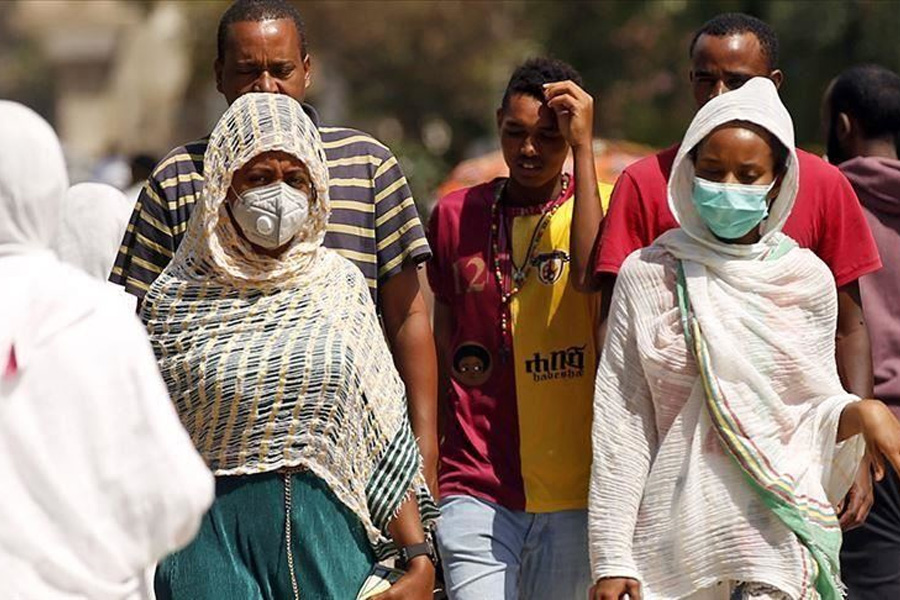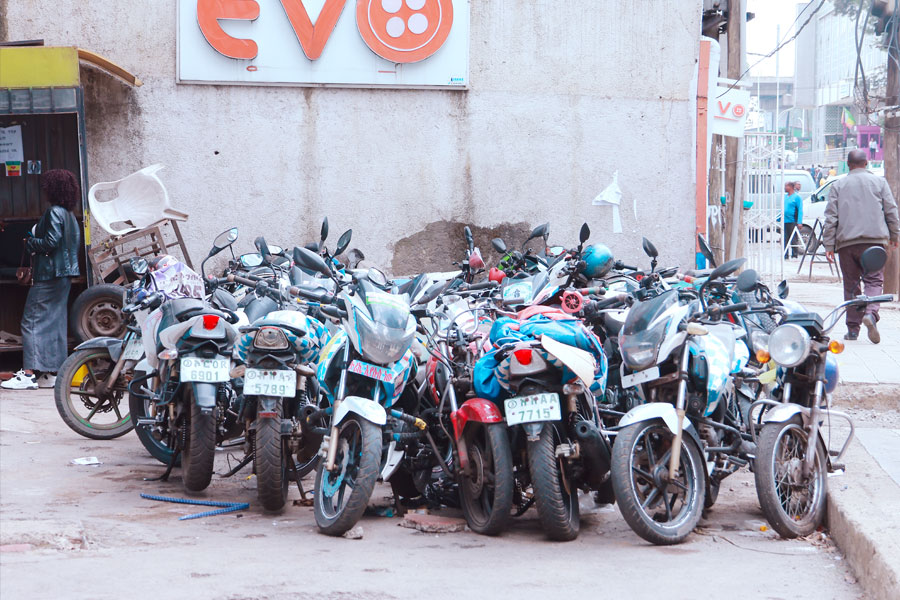
Radar | Aug 20,2024
At the crack of dawn when the forex surrender criteria was altered by the central bank, selected exporters from livestock, khat, pulse and oilseed sections were joined by authorities to discuss the ended year's export performance that registered a 1.58 billion dollar decline from the targeted amount.
The meeting at Elily International Hotel on Guinea Conakry Street saw the attendance of officials drawn from the National Bank of Ethiopia (NBE), Customs Commission and Ministry of Trade & Regional Integration (MoTRI).
Chaired by State Minister Kassahun Goffe and Girma Birru, advisor for the Prime Minister, a discussion was unveiled following a presentation by Mesfin Abebe, an advisor at the Ministry, that entailed possible causes for the lacklustre performance and plans to revive the sectors.
Officials expressed their rapture over the performance of pluses and oilseeds, which saw a significant increase in exports last year. However, they were dismayed with the performance of khat and livestock exports, which both declined. This decline in export earnings was reflected in the country's overall export earnings, which stood at 3.64 billion dollars last year, a decline from the previous year's record high of 4.2 billion dollars.
The dwindled export volumes of coffee and khat have contributed to the lacklustre performance in the ended year, where 240,000tn of coffee and 31,382tn of khat were exported worth 1.3 billion dollars and 248.36 million dollars respectively.
Although coffee exports showed a marginal decline, the performance of khat exports both in volume and earnings astoundingly plummeted by nearly half from the previous year where 56,353tn were exported earning 392.3 million dollars.
"Khat exports take the lion's share for the declined figure," said Mesfin.
The fall does not occur spontaneously. Exporters cite multiple taxations at several checkpoints, particularly near production areas, insufficient understanding of the perishable nature of khat and the weak partnership with the Somalian government as primary factors for the unprecedented result.
Mohammed Abdi was an attendee from Biftu Adugna Business S.C., a major khat exporter to Djibouti and Somalia. Established with 100 million Br capital, his company has been in business for three decades.
The informal trade and has forced him to pause shipment to Somalia after experiencing a 1,000kg volume decline which did not bring good news to his 350 employees who were paid 120 Br a day.
"It was disappointing," he said.
He indicated that the khat alone is not weighed upon passing the checkpoints but along with the protective layers and covers which results in a lofty taxation.
"Meanwhile, the export tariff is set for a plucked khat," he told Fortune with a frustrated tone.
Exporters depicted apprehension about the widespread contraband trade, depressing their businesses. They suggested inspections be extended beyond a few kilometres of the border areas.
Among the exporters who attended the meeting was Getachew Regassa from the Legerames Khat Exporters Association with 4,000 members. He voiced concern about how the 16,000Kg daily quota to Djibout's market sold for eight dollars a kilo is often filled by the illicit traders of the exporters while slashing the price by half.
According to Getachew, taxpayers who provide job opportunities for 280 employees within his Association alone should benefit from the system.
"It's unfair," he said.
Based in Dire Dewa City, another member of the Association Abdulkerim Bedri saw his daily export volume decline from 4,500kg to one-third last year. He shares the sentiment that traders who take the unconventional route played an undeniable role in their revenue decline.
Illicit exportable goods including khat and livestock worth 2.3 billion Br were seized in the year by the Customs Commission, a staggering incline from the previous year's 800 million Br.
Tegene Derese, head of inspection at the Commission, lauded the report as a successful performance. He dismissed concerns raised on the control and inspection being restricted to 15Km from the border.
"That's our jurisdiction," he said.
Of the 4,999 licenses issued to export khat, only 487 are active exporters.
In a move meant to fight the growing contraband trade that officials believed was across the board through scattered permit issuance, the Ministry retracted the mandate from regional trade bureaus.
The Ministry required exporters to present the contracts with the overseas buyers last year. This created inconvenience for exporters, as most of them reside in Dire Dawa City and neighbouring towns and had to travel long distances to the Ministry's headquarters in Addis Abeba to present their contracts, said the Advisor.
The unsuccessful negotiation with Djibouti officials to adjust the delivered quota and being outperformed by other countries' supply in Somalia's market were attributed as another challenge.
According to the Business Daily reports in August 2022, Kenya exported khat worth 2.2 million dollars to Somalia four days after entering the market.
The Advisor at the Ministry confirmed Oromia, Somali, Harari regional states and Dire Dewa City Administration impose taxes.
Oromia region is a top producer of khat with 1.3 million quintals a year, followed by the Southwestern and Sidama regional states with 650,000qtl a year each.
Oromia Revenue Bureau officials believe the tax imposition was not targeted at cornering the export but to collect revenues for infrastructural development of eastern and western Hararege Zones.
Meanwhile, farmers are vying to join the export scheme themselves as they believe to have been ripped off by multiple actors on the supply chain.
Kalid Abdulhamid, a father of three, is a farmer in the eastern Hararge zone of Haramaya town unhappy about his income compared to what intermediaries get after the market centre 23Km from his farm.
Depending on the weather conditions and access to water, he produces Aweday khat twice a year on his two hectares inherited from his father eight years ago.
The exorbitant price of fertiliser deterred him from applying which resulted in 500Kg production last year.
The farmer is not appeased with purchasing fertiliser at 4,000 Br a quintal and selling the five-kilo estimated khat bundle for 1,700 Br at peak season.
Kalid and 889 farmers under a union are considering applying for the export permit and benefit better.
"I'm being ripped off," he said.
Economists such as Shimelis Araya suggest diversifying options in terms of destinations will serve better when another country penetrates the market like this. He recalls the plummeting textile exports when Ethiopia was banned from the African Growth & Opportunity Act (AGOA).
"It should have been a lesson," he said.
While he acknowledges the regional states are attempting to increase their source of revenues, Shimelis suggests major export items be tax-free for the greater good.
The government plans to revert to last year's loss by aspiring 450 million dollars from khat exports this fiscal year.
Kassahun disclosed representatives from the Ministry travelled to Djibouti despite boring no fruit. However, he is optimistic that things will change through repeated attempts.
While he accepted that Ethiopia was outperformed by Kenya on khat export last year, he asserted that the multiple taxations at several points will be dealt with.
"The multiple checks points will be repealed," he said.
Editors' Note: This article was updated from its original version on August 28, 2023.
PUBLISHED ON
Aug 26,2023 [ VOL
24 , NO
1217]

Radar | Aug 20,2024

Radar | May 27,2023

View From Arada | Nov 09,2024

Fortune News | Mar 09,2024

Radar | Nov 16,2024

My Opinion | Jun 07,2025

News Analysis | Feb 03,2024

Fortune News | May 27,2023

In-Picture | May 12,2024

Viewpoints | May 24,2025

Dec 22 , 2024 . By TIZITA SHEWAFERAW
Charged with transforming colossal state-owned enterprises into modern and competitiv...

Aug 18 , 2024 . By AKSAH ITALO
Although predictable Yonas Zerihun's job in the ride-hailing service is not immune to...

Jul 28 , 2024 . By TIZITA SHEWAFERAW
Unhabitual, perhaps too many, Samuel Gebreyohannes, 38, used to occasionally enjoy a couple of beers at breakfast. However, he recently swit...

Jul 13 , 2024 . By AKSAH ITALO
Investors who rely on tractors, trucks, and field vehicles for commuting, transporting commodities, and f...

Oct 25 , 2025
The regulatory machinery is on overdrive. In only two years, no fewer than 35 new pro...

Oct 18 , 2025
The political establishment, notably the ruling party and its top brass, has become p...

Oct 11 , 2025
Ladislas Farago, a roving Associated Press (AP) correspondent, arrived in Ethiopia in...

Oct 4 , 2025
Eyob Tekalegn (PhD) had been in the Governor's chair for only weeks when, on Septembe...